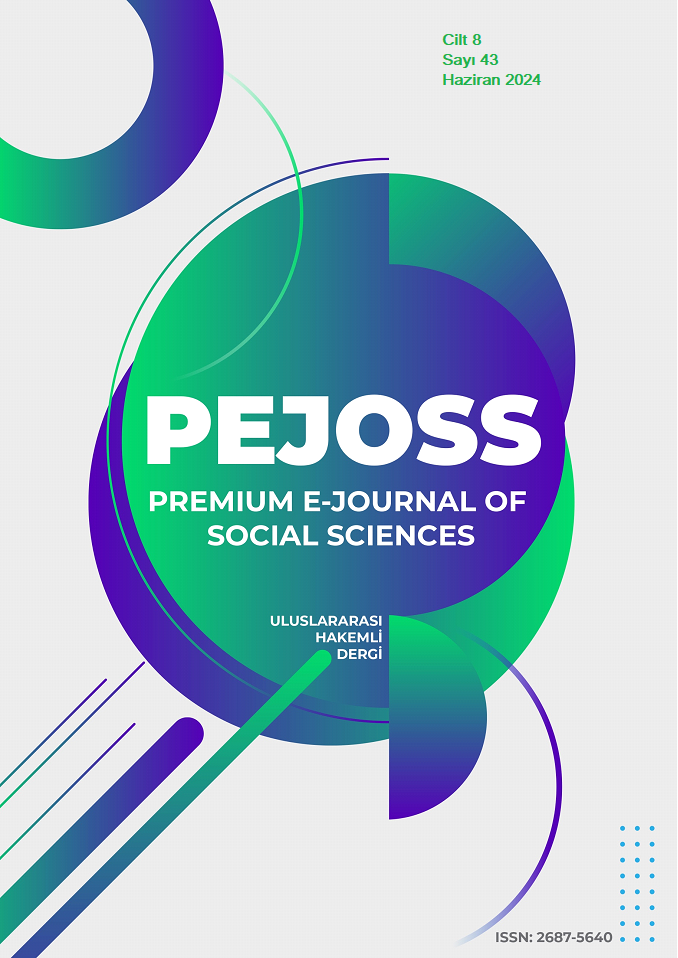Bir Kaygı Unsuru Olarak Öğretmenlerin Dijital Yeterlilikleri
DOI:
https://doi.org/10.5281/zenodo.12603675Anahtar Kelimeler:
öğretmen dijital yeterliliği, eğitim teknolojisi, mesleki kaygıÖzet
Eğitim teknolojisi, sınıflarda öğrenme deneyimini zenginleştirmek ve öğrencilerin daha etkili bir şekilde öğrenmelerini sağlamak amacıyla kullanılan bir araçtır. Ancak, öğretmenlerin bu teknolojileri kullanma konusundaki kaygıları, başarılı bir entegrasyonun önündeki engellerden biridir. Bu araştırmada öğretmenlerin dijital yeterlilikleri ile eğitim teknolojisi kullanımından kaynaklı duydukları kaygı arasındaki ilişki incelenmiştir. Araştırma nicel araştırma yöntemi ile ilişkisel tarama modelinde gerçekleştirilmiştir. Araştırmaya 316 sınıf öğretmeni dahil edilmiştir. Öğretmenlerin seçiminde tabakalamalı örnekleme yöntemi kullanılmıştır. Öğretmenlerin dijital yeterliliklerini belirlemek için Dijital Öğretmen Ölçeği ve eğitim teknolojilerinden kaynaklanan kaygıyı belirlemek için de Eğitim Teknolojileri Kullanımı Kaygısı Ölçeği kullanılmıştır. Araştırma sonuçları öğretmenlerin dijital yeterlilikleri ile eğitim teknolojisi kullanma kaygıları arasında negatif yönlü yüksek düzeyde bir ilişkinin olduğunu göstermiştir. Araştırmanın bir diğer bulgusu da öğretmenlerin dijital yeterliliklerinin tüm alt boyutlarda cinsiyet ve mesleki değişkenine göre farklılaştığını göstermektedir. Benzer bir biçimde öğretmenlerin eğitim teknolojisi kullanma kaygıları cinsiyet ve mesleki kıdem değişkenine göre farklılık gösterirken, görev yeri değişkenine göre farklılık göstermemektedir.
İndirmeler
Referanslar
Anderson, R. E., & Dexter, S. L. (2005). School technology leadership: An empirical investigation of prevalence and effect. Educational Administration Quarterly, 41(1), 49-82. https://doi.org/10.1177/0013161X04269517
Baş, G., Kubiatko, M., & Sünbül, A. M. (2016). Teachers’ perceptions towards ICTs in teaching-learning process: Scale validity and reliability study. Computers in Human Behavior, 61, 176-185.
Bingimlas, K. A. (2009). Barriers to the successful integration of ICT in teaching and learning environments: A review of the literature. Eurasia Journal of Mathematics, Science and Technology Education, 5(3), 235-245. https://doi.org/10.12973/ejmste/75275
Büyüköztürk, Ş., Çakmak-Kılıç, E., Akgün, Ö. E., Karadeniz, Ş., ve Demirel, F. (2013). Bilimsel araştırma yöntemleri. Ankara: Pegem Akademi
Creswell, J. W. (2017). Araştırma deseni: Nicel, nitel ve karma yöntem yaklaşımları (Çev. Ed. S. B. Demir). Ankara: Eğiten Kitap.
Çakıroğlu, Ü. & Akay, H. (2019). Öğretmenlerin dijital yeterlilikleri: Bir değerlendirme. Eğitim ve Bilim Dergisi, 44(198), 35-52.
Ertmer, P. A., & Ottenbreit-Leftwich, A. T. (2010). Teacher technology change: How knowledge, confidence, beliefs, and culture intersect. Journal of Research on Technology in Education, 42(3), 255-284. https://doi.org/10.1080/15391523.2010.10782551
European Commission (2018). European Framework for the Digital Competence of Educators (DigCompEdu). Publications Office of the European Union.
Fraenkel, J. R., Wallen, N. E., ve Hyun, H. H. (2012). How to design and evaluate research in education (7th Ed.). New York: McGraw-Hill.
Hauge, T. E., & Norenes, S. O. (2015). Collaborative leadership development with ICT: Experiences from three exemplary schools. Journal of Computer Assisted Learning, 31(2), 183-195.
Hew, K. F., & Brush, T. (2007). Integrating technology into K-12 teaching and learning: Current knowledge gaps and recommendations for future research. Educational Technology Research and Development, 55(3), 223-252. https://doi.org/10.1007/s11423-006-9022-5
Inan, F. A., & Lowther, D. L. (2010). Factors affecting technology integration in K-12 classrooms: A path model. Educational Technology Research and Development, 58(2), 137-154. https://doi.org/10.1007/s11423-009-9132-y
Kim, C., Kim, M. K., Lee, C., Spector, J. M., & DeMeester, K. (2013). Teacher beliefs and technology integration. Teaching and Teacher Education, 29, 76-85. https://doi.org/10.1016/j.tate.2012.08.005
Koehler, M. J., Mishra, P., & Cain, W. (2013). What is technological pedagogical content knowledge (TPACK) Journal of Education, 193(3), 13-19.
Kopcha, T. J. (2012). Teachers’ perceptions of the barriers to technology integration and practices with technology under situated professional development. Computers & Education, 59(4), 1109-1121.
Li, Y., Worch, E. A., Zhou, Y., & Aguiton, R. (2015). How and why digital generational characteristics affect technology adoption and teaching methods: Insight from a China study. International Journal of Information and Education Technology, 5(7), 547-551.
Sang, G., Valcke, M., van Braak, J., & Tondeur, J. (2010). Student teachers’ thinking processes and ICT integration: Predictors of prospective teaching behaviors with educational technology. Computers & Education, 54(1), 103-112.
Tondeur, J., Aesaert, K., Pynoo, B., van Braak, J., & Fraeyman, N. (2017). Developing a validated instrument to measure pre-service teachers' ICT competencies: Meeting the demands of the 21st century. British Journal of Educational Technology, 48(2), 462-472.
Tondeur, J., Valcke, M., & van Braak, J. (2008). A multidimensional approach to determinants of computer use in primary education: Teacher and school characteristics. Journal of Computer Assisted Learning, 24(6), 494-506. https://doi.org/10.1111/j.1365-2729.2008.00285.x
Tondeur, J., van Braak, J., Ertmer, P. A., & Ottenbreit-Leftwich, A. (2017). Understanding the relationship between teachers’ pedagogical beliefs and technology use in education: A systematic review of qualitative evidence. Educational Technology Research and Development, 65(3), 555-575.
Vrasidas, C., & Glass, G. V. (2007). Teacher professional development and ICT: Strategies and models. Teachers College Record, 109(14), 87-102.
Yalçınalp, S., & Cabı, E. (2015). A scale development study: educational technologies anxiety scale (ETAS). Elementary Education Online, 14(3), 1005-1016.
Yılmaz, E., Aktürk, A., & Çapuk, S. (2021). Dijital öğretmen yeterlilik ölçeği geliştirme: geçerlik ve güvenirlik çalışması. Adıyaman Üniversitesi Sosyal Bilimler Enstitüsü Dergisi, (38), 34-68.
İndir
Yayınlanmış
Nasıl Atıf Yapılır
Sayı
Bölüm
Lisans
Telif Hakkı (c) 2024 Premium e-Journal of Social Sciences (PEJOSS)

Bu çalışma Creative Commons Attribution 4.0 International License ile lisanslanmıştır.


